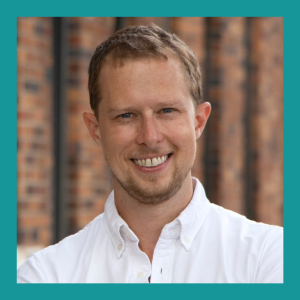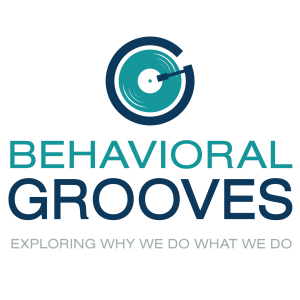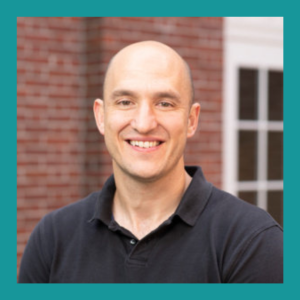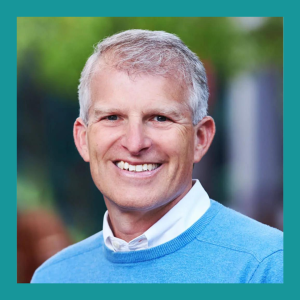
Stories, science and secrets from the world’s brightest thought-leaders. Behavioral Grooves is the podcast that satisfies your curiosity of why we do what we do. Explanations of human behavior that will improve your relationships, your wellbeing, and your organization by helping you find your groove.
Episodes

Sunday Jan 07, 2024
Cracking the Communication Code | Ben Guttmann
Sunday Jan 07, 2024
Sunday Jan 07, 2024
Kurt and Tim kick off the new year with communications expert Ben Guttmann in an episode on simplifying messages.
Ben's seemingly simple lessons pack a punch, offering a treasure trove of insights into mastering clear and concise communication for both personal and professional success. Join Kurt and Tim as they navigate through Ben's five key principles, uncovering the secrets to crafting communications that truly hit the mark. From prioritizing benefits to maintaining focus, ensuring salience, embracing empathy, and adopting minimalism, the trio explores how these principles can transform your messaging strategy.
Discover how large organizations often lose sight of what customers are looking for and gain valuable insights into Ben’s exploration of effective vs. ineffective slogans and taglines for businesses. Unpack the importance of employing the 10-100 most common words and learn how testing messages with an "enlightened idiot" can be a game-changer.
Whether you're a cog in a corporate machine or an individual seeking to sharpen your communication skills, this episode offers practical lessons on making your message resonate and connect. Kickstart the new year with a communication overhaul and be sure to share this episode with anyone in your life in need of a communication refresh. Don't miss out on the keys to killer communication – like, share, and tune in now!
© 2023 Behavioral Grooves
Topics
(4:29) Introduction and speed round
(9:23) Simplifying communication in a busy world
(14:15) Bridging the gap between message creators and receivers
(23:43) Effective marketing strategies for big corporations
(34:41) The 1000 most common words for clear communication
(39:33) Communicating with aliens and desert island music
(45:59) Grooving Session: Communication and breaking through clutter
© 2023 Behavioral Grooves
Links
Ben Guttman Simply Put: Why Clear Messages Win (and How to Design Them
Randall Munroe Thing Explainer
Musical Links
Harold Faltermeyer Top Gun Anthem
Arcade Fire Everything Now

Monday Jan 01, 2024
Groove Through 2023: A Year in Review with Kurt and Tim
Monday Jan 01, 2024
Monday Jan 01, 2024
Happy New Year from Kurt and Tim!
As we reflect on the past year, join us in revisiting some of the most impactful and insightful conversations from Behavioral Grooves in 2023. Grateful for the time and wisdom shared by our wonderful guests, we delve into key topics through the lens of behavioral science, aiming to provide you with valuable insights for both your professional and personal life.
From embracing uncertainty and cultivating growth mindsets to exploring the power of "magic words" and understanding your future self, this compilation covers a diverse range of subjects, including the psychology of scams and the challenges of parenting. Settle in, unwind, and take a moment to revisit the highlights of 2023 as we gear up for what the future holds (as much as we can anticipate!).
As always, thank you for listening to Behavioral Grooves. We appreciate your continued support and look forward to many more exciting developments in 2024!
© 2023 Behavioral Grooves
Topics
(2:17) Yael Schonbrun, parenting, and fostering growth mindsets.
(8:48) Nathan and Susannah Furr, embracing uncertainty
and embracing possibility.
(13:23) Jonah Berger, the enchantment of "magic words" and the art of reframing language.
(18:54) Hal Hershfield, navigating your future self and shedding light blind spots
(23:06) Daniel Simons & Chris Chabris, the intricate world of scams, and maintaining hope.
© 2023 Behavioral Grooves
Links
Nathan & Susannah Furr on Embracing Uncertainty

Monday Dec 25, 2023
Monday Dec 25, 2023
Continuing their pursuit of knowledge, Kurt and Tim explore the impactful books that have shaped their perspectives in 2023. In this episode, they unwrap the highlights of their literary journey, offering listeners a condensed version of why each book made a lasting impression and what readers can expect to gain from delving into these insightful pages.
Discovering one's groove is a nuanced journey, often fueled by new ideas, fresh perspectives, and a revisit to timeless concepts presented in innovative ways. In this annual wrap-up, Kurt and Tim dive into a diverse array of books that have enriched their intellectual tapestry, underscoring the influential role of literature in deepening their understanding of human behavior.
Covering a spectrum of topics, from uncertainty and effective communication to parenting and attention span, this year's Top 10 (or is it 11?) books offer a wide-ranging exploration. If you're searching for insights on a specific topic, chances are it's in one of these books!
Join in to uncover the standout Behavioral Science books of the year and gain insights that can enhance your understanding of human behavior. As always, thank you for being a part of the Behavioral Grooves community this year, and we look forward to hearing your thoughts on the Top 10!
Links
- The Upside of Uncertainty: A Guide to Finding Possibility in the Unknown by Nathan and Susanna Furr
- Writing for Busy Readers by Todd Rogers
- Think Faster, Talk Smarter by Matt Abrahams
- Work, Parent, Thrive by Yael Schonbrun
- Magic Words by Jonah Berger
- Humanizing Rules by Christian Hunt
- Anatomy of a Breakthrough: How to Get Unstuck When It Matters Most by Adam Alter
- Nobody's Fool: Why We Get Taken In, and What We Can Do About It by Dan Simons and Chris Chabris
- Your Future Self by Hal Hershfield
- Attention Span: A Groundbreaking Way to Restore Balance, Happiness, and Productivity by Gloria Mark
- The Perfection Trap: Embracing the Power of Good Enough by Thomas Curran

Sunday Dec 17, 2023
Balancing Work Friction and Fatigue | Huggy Rao
Sunday Dec 17, 2023
Sunday Dec 17, 2023
Have you or someone you know fallen victim to the detrimental effects of Jargon Monoxide? If so, there might be compensation waiting for you.
Joining Kurt and Tim in this episode, Huggy Rao delves into the critical aspects of organizational friction and the looming specter of burnout within workspaces. Huggy underscores the need for clear and transparent communication to escape the wearisome trap of workspeak, identified here as "jargon monoxide."
Tune in for a succinct and transparent conversation as Huggy dissects the challenges organizations encounter with an inherent bias towards addition, prioritizing the incorporation of new elements over the removal of unnecessary ones. He sheds light on the paradoxical scenario where leaders receive accolades for their additive contributions, leaving the significance of subtraction undervalued and misunderstood.
In the episode's conclusion, Kurt and Tim steer the discussion towards reframing friction as an avenue for improvement rather than a hindrance. They explore effective strategies for mitigating workplace friction and beyond, providing valuable insights for those grappling with end-of-the-year work fatigue. Don't miss out on this episode if you're seeking a fresh perspective on navigating workplace challenges.
© 2023 Behavioral Grooves
Topics
(6:12) Intro and Speed Round
(12:21) Good Friction vs Bad Friction
(17:38) Health Pyramids and Reframing the Workplace
(25:07) Rational vs Emotional
(30:25) Corporate time wasters
(37:04) Addition bias and Obliviousness
(45:10) Jargon Monoxide
(54:55) Grooving Session: Strategies for Burnout and Friction
© 2023 Behavioral Grooves
Links
Musical Links
Camarón De La Isla Como El Agua (Tangos)
Yo Yo Ma - Yo-Yo Ma - Bach: Cello Suite No. 1 in G Major, Prélude (Official Video)

Sunday Dec 10, 2023
The Eight Superpowers of Confidence | Lisa Sun
Sunday Dec 10, 2023
Sunday Dec 10, 2023
Step into a captivating conversation as Tim and Kurt engage with Lisa Sun, the author of Gravitas. Lisa introduces the intriguing concept that each of us possesses superpowers—not the extraordinary kind, but those that ignite leadership, achievement, and self-belief. In this discussion, Lisa unveils the eight superpowers that make up confidence.
Moving beyond mere behavioral traits, Lisa emphasizes that confidence is fundamentally a mindset. Uncover the key to building self-confidence by recognizing strengths and celebrating past successes. While we may not possess telekinetic abilities, join Lisa, Kurt, and Tim as they explore how shifting our mindset, silencing our inner critic, and reframing challenges as opportunities can foster a stronger sense of self-worth.
This engaging episode offers insights into gender differences in confidence and the societal need for a redefined understanding of this crucial trait. During the Grooving Session, Kurt and Tim share practical strategies for altering perspectives on life's challenges and reframing emotions for better understanding and management.
Ready to unlock your mental superpowers? Join Lisa, Kurt, and Tim in this enlightening episode and embark on your journey to a more confident self.
© 2023 Behavioral Grooves
Topics
(2:37) Intro and Speed Round
(4:06) Creativity, self-confidence, and personal growth
(9:09) Ageism, self-doubt, and confidence
(12:15) Building self-confidence
(20:45) Inner child and inner critic
(25:58) Self-awareness, self-confidence, and overcoming fears
(35:48) Leadership qualities, gender, and confidence
(41:32) Workplace culture and gender bias
(53:11) Grooving Session: Confidence and self-expression
© 2023 Behavioral Grooves
Links
Kelly Shue and Women’s Promotions
Musical Links
John Lennon “Imagine” https://www.youtube.com/watch?v=YkgkThdzX-8
The King and I “Shall We Dance” https://www.youtube.com/watch?v=QgVPnWmUqd4
Boys II Men “Motownphilly” https://www.youtube.com/watch?v=Rciee-oQLoI
Mariah Carey “We Belong Together” https://www.youtube.com/watch?v=0habxsuXW4g

Sunday Dec 03, 2023
Rethinking Behavioral Science | Adam Mastroianni
Sunday Dec 03, 2023
Sunday Dec 03, 2023
While Tim finds himself confined to a plane, Kurt engages in a captivating one-on-one session with researcher Adam Mastroianni. Together, they delve into the intriguing world of behavioral science, aiming to unveil the concealed truths behind the notorious Big Dentist conspiracy urging everyone to floss.
However, the episode takes an unexpected turn as Kurt and Adam embark on a thought-provoking exploration of the past, present, and future of behavioral science. From a history tainted with fraudulent studies to a present that seems tepid in terms of groundbreaking discoveries, the duo contemplates what lies ahead. Do we dare to take risks, or is maintaining the status quo the safer route? Moreover, does the current academic system truly foster risk-taking?
Join us for a conversation that challenges assumptions, sparks innovation, and confronts the stigma surrounding the belief that flossing is the sole path to dental health. Tune in as we navigate the future of behavioral science, encouraging a fresh perspective on academia and the pursuit of knowledge.
© 2023 Behavioral Grooves
Topics
(4:09) Intro and Speed Round
(8:19) When should we stop talking?
(11:47) Does the fact that a study was found fraudulent matter?
(16:18) Are we out of groundbreaking discoveries?
(22:03) The limitations in current research and the need for a paradigm shift
(27:28) Shifting mindset in scientific research
(36:39) Flossing and the importance of context
(48:35) Research insights and desert island music
(52:19) Grooving session: Science, academia, and the importance of new ideas
© 2023 Behavioral Grooves
Links
Experimental History (Blog) https://experimentalhistory.wordpress.com/
"Do Conversations End When People Want Them To?" https://journals.sagepub.com/doi/10.1177/0956797617749596
The Cochrane Collaboration Meta-analysis on Flossing https://www.cochrane.org/CD011146/ORAL_flossing-reduce-gingivitis-and-plaque
Rory Sutherland's Perspective on Choice https://www.ted.com/talks/rory_sutherland_life_lessons_from_an_ad_man/transcript
Musical Links
Baz Luhrmann "Everybody's Free to Wear Sunscreen" https://www.youtube.com/watch?v=sTJ7AzBIJoI
They Might Be Giants "Hot Dog!" https://www.youtube.com/watch?v=NoavHX75s_E
Talking Heads "Psycho Killer" https://www.youtube.com/watch?v=eauZzwt8Ci8

Sunday Nov 26, 2023
Navigating Societal Rifts | Michèle Lamont
Sunday Nov 26, 2023
Sunday Nov 26, 2023
Tensions around the dinner table? Trouble finding common ground with friends and family? Renowned sociologist Michèle Lamont joins Tim and Kurt to unravel why the world seems more polarized than ever.
In this episode, Lamont delves into pressing societal issues, from tribalism to media polarization, offering expert insights and defining key terms with historical context. She explores generational shifts in perspectives on recognition and identity, asking how we can bridge divides between different worldviews.
Beyond analysis, Lamont inspires change, discussing the transformative power of reframing narratives to cultivate hope. Join us for a conversation challenging stereotypes, and promoting a society where everyone feels valued. Kurt and Tim end the episode with a Grooving Session where they encourage us to strengthen the recognition of our shared humanity and invite listeners to be part of the change. Tune in for a fresh perspective on navigating a divided world.
© 2023 Behavioral Grooves
Topics
(03:22) Michèle Lamont intro and Speed Round
(08:08) Bridging generational divides
(20:49) Changing hearts and minds to address inequality
(26:36) Countering negative narratives
(36:59) Generational differences in identity and inclusion
(41:24) Race, identity, and mental health
(47:23) Grooving session: Overcoming polarization
© 2023 Behavioral Grooves
Links
Michelle’s Book: Seeing Others
Monbiot, George, “Neoliberalism – the ideology at the root of all our problems,” The Guardian, 15 April 2016. Article
Peter Harvey research and article: How Schools Teach Children about their Social Station
Jean Twenge The Future of Generational Differences
National Domestic Workers Alliance
Musical Links
The Doors “Break on Through (To The Other Side)”
Patti Smith “Because the Night”

Sunday Nov 19, 2023
Evolving Minds: A Conversation on Attention Spans | Gloria Mark PhD
Sunday Nov 19, 2023
Sunday Nov 19, 2023
Ever feel your attention… drifting? Want to get better at being present? Join Kurt and Tim as they delve into the world of shrinking attention spans alongside researcher Gloria Mark. Uncover the eye-opening revelations from Mark's research, highlighting a significant decrease in attention spans within just a few short years.
Explore the intricate ways in which the digital world and screen time impact our ability to focus, all while discovering the empowering idea that we possess agency over our attention. Gloria Mark shares invaluable tips for enhancing concentration, including insights into understanding your natural rhythms, setting goals, and connecting with nature.
In this attention-grabbing episode, witness how our brains and behavior are evolving in today's increasingly distracting world. Gain a deeper understanding of the intricate relationship between technology, attention spans, and individual agency. It's a journey into the evolving landscape of our minds and behaviors, offering practical tips to thrive in an era where distraction seems inevitable.
© 2023 Behavioral Grooves
Topics
(5:33) Intro and speed round
(8:31) Myths and facts about attention span
(12:54) Attention as a resource
(19:11) Attention span, flow, and media consumption
(31:22) Staying focused and avoiding distractions
(37:25) Attention, free will, and musical rhythm
(45:07) Desert Island music
(52:20) Grooving session - finding your groove through nature and productivity
© 2023 Behavioral Grooves
Links
Gloria’s Book - https://www.harpercollins.com/products/attention-span-gloria-mark?variant=40346590117922
Tim Urban: Inside the mind of a procrastinator - https://www.youtube.com/watch?v=arj7oStGLkU
Wait But Why - https://waitbutwhy.com/2013/10/why-procrastinators-procrastinate.html
Nicholas Car "The Shallows" - https://www.nicholascarr.com/?page_id=16
Barry Lazarowitz (drummer): https://www.allmusic.com/artist/barry-lazarowitz-mn0002291879/credits
Musical Links
Echo and the Bunnymen “People are Strange” (cover) https://www.youtube.com/watch?v=eTviNc52igI
Roger Daltry “Don’t Let the Sun Go Down on Me” (cover) https://www.youtube.com/watch?v=GLQ6rpL_QLo
Sarah Vaughan “Broken Hearted Melody” https://www.youtube.com/watch?v=UOWJC-fVSAI
Samara Joy “Guess Who I Saw Today” https://www.youtube.com/watch?v=X03lvK7qoco

Sunday Nov 12, 2023
The Power of Brevity | Todd Rogers
Sunday Nov 12, 2023
Sunday Nov 12, 2023
Does everybody skim? Todd Rogers, co-author of “Writing for Busy Readers” joins Kurt and Tim to discuss just that. In this insightful episode, Todd shares principles and rules that will transform your written communication skills. Join the conversation as Todd challenges the traditional notions of taste and style in writing, emphasizing the power of concise and evidence-backed strategies for effective communication in the 21st century.
Discover the art of "less is more" as Todd shares practical steps and easy-to-follow techniques to overcome common challenges in conveying crucial information. Gain profound insights into the writer's responsibility to readers and navigate the dynamic landscape of social media communication. Todd's expertise provides a roadmap for achieving your communication goals with impact and precision.
During their grooving session Kurt and Tim exploring the importance of mapping information out before you write and offer helpful tips and tricks they’ve used to achieve success in their written communication over the years. Whether you're drafting corporate emails or engaging in casual conversations, this episode is a must-listen, providing practical guidance to elevate your communication skills and thrive in a world where brevity is key. Tune in and revolutionize the way you convey information in today's fast-paced environment!
© 2023 Behavioral Grooves
Topics
(4:34) Welcome and Speed Round
(6:53) Does everybody skim?
(9:14) Writing for busy readers
(14:36) Writing effectively
(19:26) The new rules of writing
(29:20) Focusing on the reader’s perspective
(40:03) Writing for social media and user engagement
(46:47) Desert Island Music
(48:40) Grooving session: Tips for improving communication
© 2023 Behavioral Grooves
Links
Writing for Busy Readers: https://writingforbusyreaders.com/
The Plain Writing Act of 2010: https://www.govinfo.gov/content/pkg/PLAW-111publ274/pdf/PLAW-111publ274.pdf
Space Between Words: The Origins of Silent Reading: https://books.google.ca/books/about/Space_Between_Words.html?id=w3vZaFoaa3EC
Musical Links
Beyonce (Renaissance) https://youtube.com/playlist?list=PLHFeMk_LSwG5VVTbOVIutGbA3PsGP0NPO&si=27uBQ3pOLw3WTUrP
Taylor Swift (Teardrops on My Guitar) https://www.youtube.com/watch?v=xKCek6_dB0M
The Beatles (Come Together) https://www.youtube.com/watch?v=45cYwDMibGo

Sunday Nov 05, 2023
Unlocking the Power of Effective Communication | Matt Abrahams
Sunday Nov 05, 2023
Sunday Nov 05, 2023
Communication is a vital skill we all use, but do we truly understand its profound impact on our lives? Join Kurt and Tim as they engage in a captivating conversation with communication expert Matt Abrahams. Matt, an accomplished author, educator, and co-host of "Think Fast, Talk Smart," takes us on a journey into the heart of effective communication.
Discover the secrets to spontaneous speaking and hone your communication skills with practical insights and actionable steps. From connecting with your audience to creating the best toasts at parties, this episode is a masterclass in the art of communication. Matt reveals the magic of active listening and the importance of paraphrasing to strengthen your relationships.
Make anxiety your ally as you prepare for public speaking and various communication scenarios. With a wealth of global experience, Matt guides us through negotiation, persuasion, and even the role of creativity in communication.
During their Grooving Session, Kurt and Tim talk about their own personal experiences with public speaking and communication, sharing anecdotes and advice from their own victories and defeats. Whether you’re delivering a keynote presentation or sharing a story with friends, this episode will offer you vital tips towards unlocking your full communication potential!
© 2023 Behavioral Grooves
Topics
(2:39) Welcome and speed round questions
(6:24) Matt’s Book and the fear of public speaking
(9:51) Overcoming the fear of public speaking and roadblocks
(15:05) Maximizing Mediocrity?
(18:50) Giving better toasts
(23:53) The M&M’s of Public Speaking
(30:24) Matt’s Podcast
(37:20) Chopin, Jazz, and off-the-cuff conversation
(42:43) Desert Island Music
(46:17) Grooving Session with Kurt and Tim on Public Speaking
© 2023 Behavioral Grooves
Links
Matt Abrahams: https://mattabrahams.com/
Think Faster, Talk Smarter: https://www.simonandschuster.com/books/Think-Faster-Talk-Smarter/Matt-Abrahams/9781668010303
Think Fast, Talk Smart: https://podcasts.apple.com/us/podcast/think-fast-talk-smart-communication-techniques/id1494989268
Matt Abrahams and Alia Crum: https://www.gsb.stanford.edu/insights/mindset-matters-how-embrace-benefits-stress
Speaking Up Without Freaking Out: https://www.youtube.com/watch?v=XIXvKKEQQJo
Musical Links
Rodrigo y Gabriela "Hanuman": https://www.youtube.com/watch?v=ENBX_v1Po1Y
Lynyrd Skynyrd "Free Bird": https://www.youtube.com/watch?v=0LwcvjNJTuM
ACDC "Thunderstruck": https://www.youtube.com/watch?v=v2AC41dglnM
